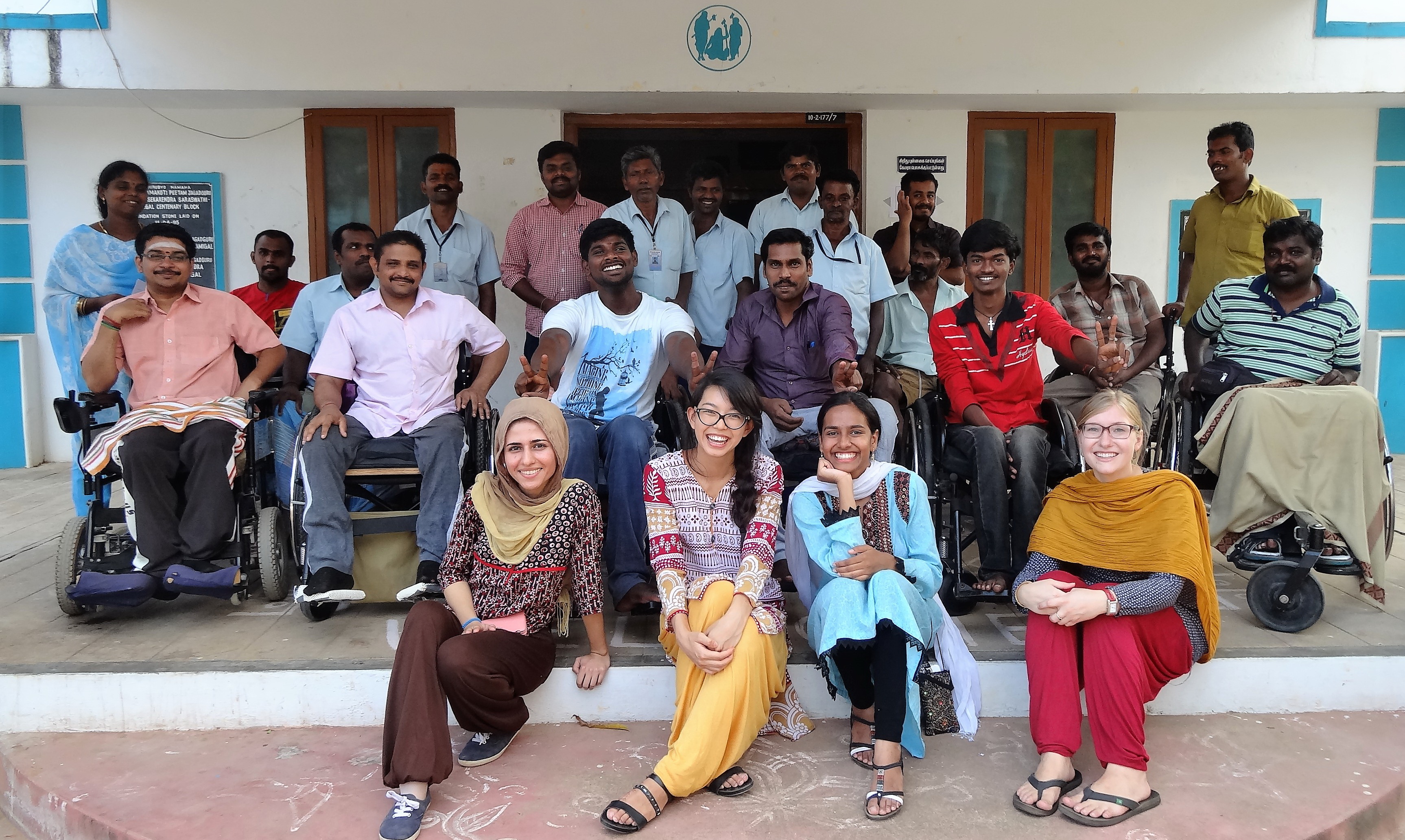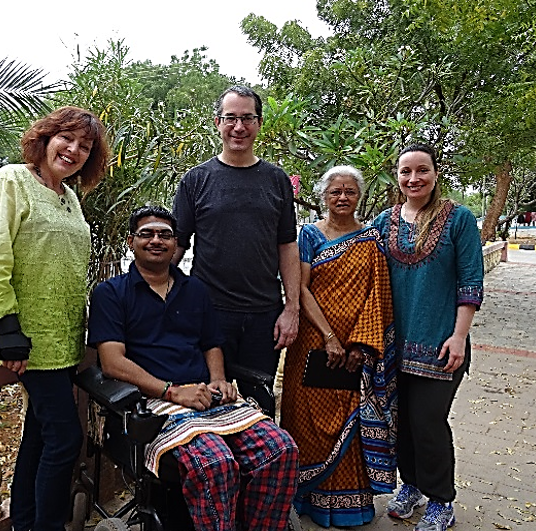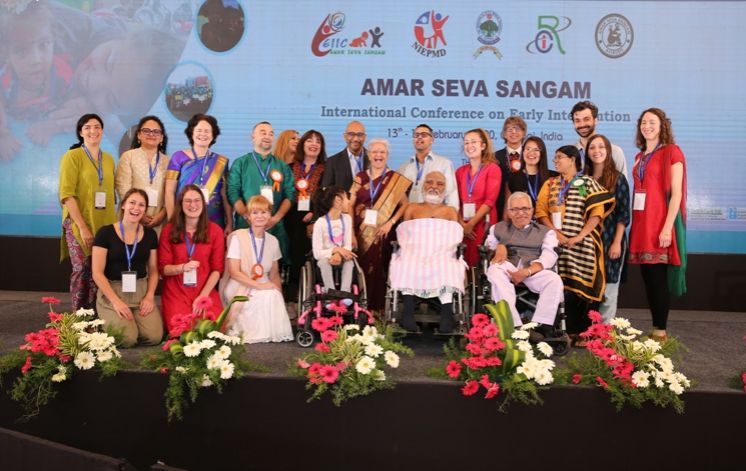
The early years of the ASSA McGill GHRI Partnership
The partnership between the School of Physical & Occupational Therapy (SPOT) and Amar Seva Sangam Ayikudy (ASSA) began in the Fall of 2012 when a McGill University Biology student and ASSA volunteer emailed Professor Caroline Storr, Academic Coordinator of Clinical Education, Occupational Therapy program at SPOT, with an interesting fieldwork learning opportunity for students in the professional rehabilitation program. The student shared a captivating video, Amar Seva Sangam- A Valley for the Disabled, which portrayed a unique community located in the state of Tamil Nadu, South India, where people with different physical and cognitive abilities aimed to live, function and learn harmoniously. As part of this vision, the community wanted to add more rehabilitation professionals to their services.
The Valley for the Differently Abled – ASSA, also known as the community of hope was first created in 1981 by Shri S. Ramakrishnan, who became a quadriplegic at the age of 20 years and in 1992 was joined by the honorable secretary, Sri S. Sankara Raman, a chartered accountant and also a wheelchair user. Together they pursued their dream of building a barrier-free community to help all people with physical and cognitive impairments.
Amazed with the vision and resourcefulness of this small community, Caroline Storr set out to see if SPOT students interested in global health fieldwork could contribute to this endeavor and learn more about the community-based rehabilitation approach used at ASSA. The plan was to organize eight-week-long fieldwork electives for McGill occupational therapy students, including remote and on-site supervision by Canadian occupational therapists, whose presence would enhance the rehabilitation care available at ASSA. Collaborating with Dr. Dinesh Krishna, of Handi-Care International and Janna MacLachlan, then an OT student from Western University who had studied at ASSA, they arranged for the first McGill students to complete the program’s required clinical fieldwork at ASSA in 2013.
The first McGill student fieldwork electives at Amar Seva Sangam Ayikudy (ASSA) Samuel Provost, one of the first McGill University occupational therapy students to complete clinical fieldwork at ASSA, 2013.
Samuel Provost, one of the first McGill University occupational therapy students to complete clinical fieldwork at ASSA, 2013.

The McGill rehabilitation students returned from the first fieldwork experience with enthusiasm and all members involved in this new partnership recognized the value and opportunity of expanding the scope and duration of collaborative rehabilitation training activities throughout the year. Working together with the National Committee on University Fieldwork Education – International Fieldwork group (CUFE-IFW), a model was developed to provide ethical and sustainable fieldwork experiences to students studying not only at ASSA but in any low- and middle-income areas where occupational therapy services are not readily available and resources may be limited.

To sustain and further improve the fieldwork-service learning program and research collaborations with ASSA, Caroline Storr, Dr. Dinesh Krishna and colleagues reviewed the partnership program using the WEIGHT guidelines to help identify, organize and prioritize future directions. This appraisal, Building sustainable fieldwork partnerships between Canada and India: Finding common goals through evaluation was successfully published and presented at the World Federation of Occupational Therapy Conference (2017), South Africa.
Visit Handi-Care International for student photos and testimonials throughout the years.
Building research collaborations Professors Caroline Storr, Phiippe Archambault, and Crystal Garnett with ASSA administration members on visit to Tamil Nadu (2017).
Professors Caroline Storr, Phiippe Archambault, and Crystal Garnett with ASSA administration members on visit to Tamil Nadu (2017).

In 2017, McGill University faculty members traveled to ASSA to further explore research possibilities and collaborations. They learned about the early intervention program and the following year, The Effectiveness of Community Rehabilitation Worker Case Identification and Prevalence of Developmental Delay Among Children Under 6 in Rural Tamil Nadu: A Cross-Sectional Study and The Assessment of Community Rehabilitation Workers’ Perception of the Training Experience in Rural South India were completed as masters research projects by McGill occupational and physical therapy students, supervised by McGill faculty and ASSA rehabilitation staff.
Interestingly, one of these master’s projects led to a larger knowledge translation project on how best to train health care professionals and community rehabilitation workers (CRWs) who work in rural areas. This 2018 research collaboration, led by Matthew Hunt PT, PhD (SPOT), Dinesh Krishna, MD, (Handicare), Ram Ponnusamy, PT (ASSA), and Anik Goulet, PT (SPOT), aimed to develop, implement, and evaluate a train-the-trainer initiative for the community rehabilitations workers and rehabilitation specialists in a village-based community-based rehabilitation program run by ASSA. The project, funded by an Edith-Strauss grant, resulted in the first research publication for the ASSA Early Intervention Project, An integrated knowledge translation project to develop, implement, and evaluate a train-the-trainer program at a community rehabilitation program in Tamil Nadu, India. As well, physiotherapist, Ram Ponnusamy (ASSA) completed an observership with SPOT and in two Montreal rehabilitation centers; the Jewish Rehabilitation Centre and the Institut de réadaptation Gingras-Lindsay-de-Montréal. The ASSA team has subsequently integrated aspects of this curriculum in other training programs.
The present-day scene
Today, the grassroots non-governmental organization has become a thriving peaceful village nestled at the base of a mountain range in rural South India. The dream has been made possible with years of hard work, dedication, donations, and an important partnership with the charitable organization Handi-Care International Canada. The large community of accessible buildings consists of a specialized spinal cord treatment unit, a vocational training center, a sewing unit, a caliper unit, integrated elementary schools, and specialized university-level education units, all of which are seamlessly connected by accessible walkways. The village has achieved green sustainability with abundant vegetable gardens interspersed through the landscape, and impressive water, waste management, and solar energy systems. Children and adults who have severe physical and cognitive disabilities and would otherwise not have access to rehabilitation services are supported to grow and become happy, confident individuals who pursue studies and activities of their choice with adaptations as needed.

In February 2020, ASSA hosted the First International Conference on Early Intervention, bringing together international organizations that could continue to move forward this unique program to diverse populations in rural settings. This inaugural conference concluded with a celebration of successes and an official announcement by the governor of the state Tamil Nadu to fully fund a new mVBRI App, an integral part of the early intervention program, to be used across the state where there is an estimated number of over 54 000 children aged 0-6 with disabilities. Several SPOT faculty and students took part in the conference, see photo above.
Throughout the years, students have been involved in all aspects of the above projects, whether completing global health electives for their required program fieldwork courses, helping to prepare the next group of students at the SPOT International fieldwork symposium or collecting data for the mVBRI app. Chamila Anthonypillai, today an Occupational Therapist, completed her fieldwork experience as a student in 2018. She was involved in the Train-the-Trainer project and will return to ASSA as a Canadian occupational therapist to supervise future students, read her contribution in this blog post covering the Train-the-Trainer project.
Future projects and possible collaborations include the building of a post-acute care center, research into post-vocational training outcomes of spinal cord clients, exploration of the new APP (mVRI app) and it's feasibility with the Cree Bay St James community, and a webinar on cultural awareness to help bridge the cultural divide between Canadian and Indian standards of occupational therapy practice; Dr. Franzina Coutinho, an Occupational Therapist at PD Hinduja Hospital, and McGill University Affiliate has been offering small group Skype workshops to all Canadian student teams.
Watch the most recent video depicting the present-day ASSA community, produced with Handi-Care International, Valley of Hope – Amara Seva Sangam.
In India, conservative estimations indicate that there are 26.8 million people with disabilities, and due to poverty, stigma and lack of resources, they are among the most excluded for rehabilitation services (Kumar et al, 2012; Saikia et al, 2016). The scale of need for rehabilitation and other services is shown by the prevalence of developmental delays amongst children. In Tamil Nadu, a mostly rural state of over 88 million people, an estimated 2.1% of children have developmental delays.
To get involved or learn more contact please contact caroline.storr [at] mcgill.ca (Professor Caroline Storr. )
